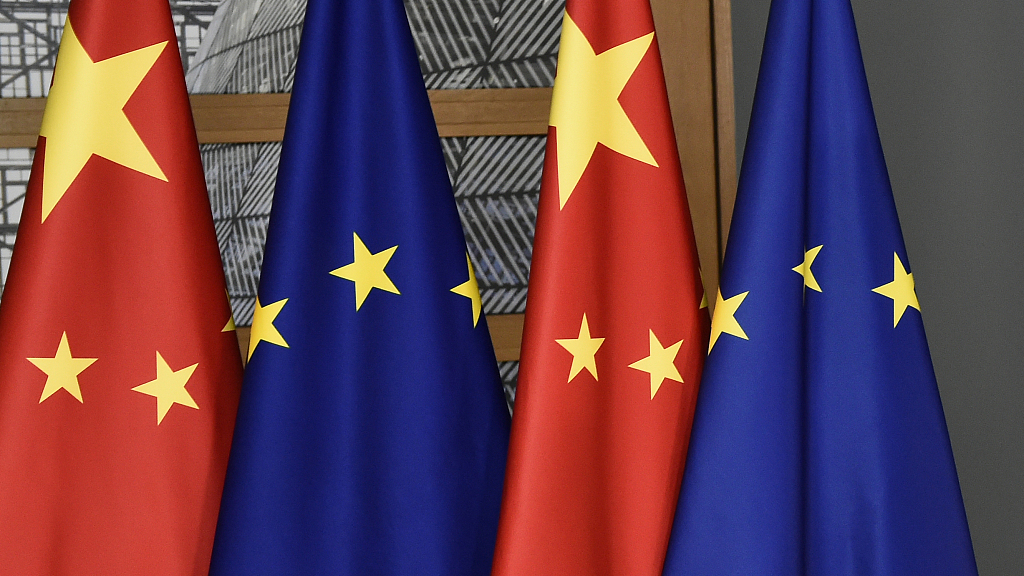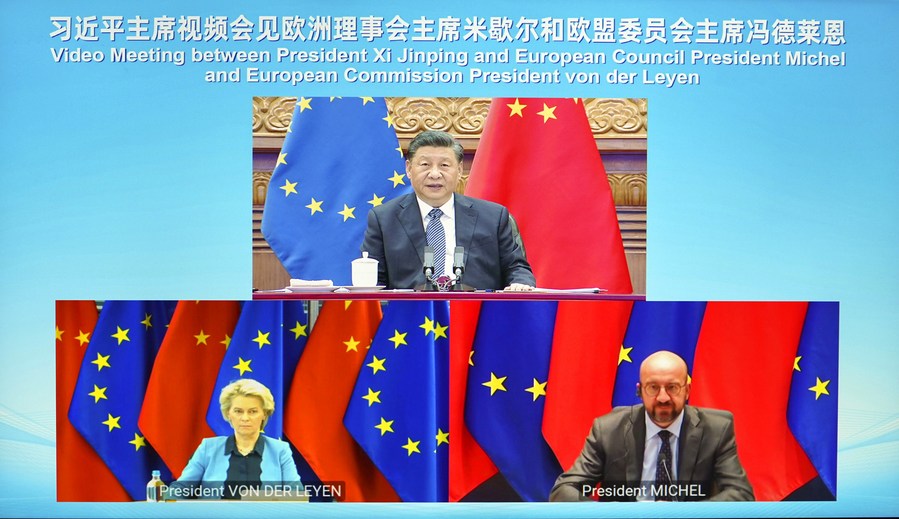
Editor's note: Azhar Azam works in a private organization as a market and business analyst and writes about geopolitical issues and regional conflicts. The article reflects the author's opinions and not necessarily those of CGTN.
Leaders at the 23rd China-EU Summit presented different approaches for resolving the conflict in Ukraine, but they all sought peace and stability in the European peninsula. As ripple effects of the war reach regional economies, some of which are Beijing's key trade partners, the bloc would soon understand that the continent's security is in Chinese interests too.
Beijing and Brussels agreed that the war threatened international security and the global economy, European Council President Charles Michel tweeted. As major global powers and leading economies, they have a "shared responsibility" toward global security. There's also a need to count on this consensus and act independently and increase communication to safeguard international economy and stability.
An assessment of the United Nations Conference on Trade and Development (UNCTAD) last month warned of the negative impacts of the conflict on the international economy and its alarming implications for the developing countries, especially the ones in Africa, as well as least-developed nations. The evolving situation necessitates an increased cooperation between China and the EU as the global body has downgraded global economic growth forecast from 3.6 percent to 2.6 percent for 2022.
The rapidly worsening economic outlook from the UNCTAD is a stark reminder of cataclysmic effects of the war. With conflict putting further upward pressure on energy and staple food prices and adding to production costs, trade disruptions and sanctions may have a crippling effect on long-term investment. These factors, coupled with heightened financial volatility and complex global supply chain reconfigurations, could mark a potential shift from land to "expensive and overstretched" maritime transport between Asia and Europe.
Even in a pandemic-stricken 2021, China's trade with the EU rose 27.5 percent to more than $828 billion. The China-Europe freight train service, an important component of the Belt and Road Initiative, also reported sizable growth of 22 percent, making 15,000 trips last year. This mutually beneficial partnership and deepening bilateral relationship shouldn't be influenced by the U.S.-concocted "China threat" narrative.
Realizing the intensity of economic challenges, Brussels took the summit as an opportunity to pore over the state of its relationship with Beijing and reiterate the importance of cooperation in the areas of mutual interest, including trade, climate change and health, to pave the way for the next high-level trade and economic and digital dialogues, foster constructive engagement on decarbonization and mull over an international plan to respond to future health crises.
At the summit, China and the EU evaluated the progress on bilateral cooperation and mandated top-ranking consultations to make headway on issues including environment, trade, digital technology, energy and food security. Brussels supported the one-China principle and intended to move toward renewables and decarbonization with Beijing. It explained the European leaders were deeply concerned about economic fallouts of the conflict, expecting China to play a positive role in the middle of an uncertain regional economic future.
Ahead of the meeting, Brussels argued neutrality wasn't possible in the Moscow-Kyiv conflict. The stance is a bit too hard and oppugnant to the norms of diplomacy and international relations. Since the EU goals, such as establishing a ceasefire, ensuring safe humanitarian corridors and quickly ending the war, are in tune with those of China to obviate the risks of further escalation, the bloc ought not to oppose an objective and impartial position that provides a fair view of the conflict and may help to calm tensions.

Chinese President Xi Jinping meets with European Council President Charles Michel and European Commission President Ursula von der Leyen via video link in Beijing, China, April 1, 2022. /Xinhua
Chinese President Xi Jinping meets with European Council President Charles Michel and European Commission President Ursula von der Leyen via video link in Beijing, China, April 1, 2022. /Xinhua
At the summit again, Chinese President Xi Jinping described the conflict as "deeply regrettable" and reiterated China's support for the peace talks. Brussels should welcome Beijing's expression of peace without gauging it on America's hate-scaled measuring rule. Both sides need to collaborate on commonalities, push back differences and pursue engagement to shield the valuable relationship.
The bloc should also beware of toeing the line of Washington, which is trying to make China a scapegoat for its failures, using the Ukraine crisis to drive a wedge between China and the EU and pressurizing the latter to consider the former a "strategic adversary." In a world battered by U.S. protectionism and unilateralism, Beijing and Brussels must exercise an abundance of caution and make joint efforts for a peaceful resolution of the conflict to thwart threats to the EU security and economy.
Even though China has expressed concerns about the war in Ukraine and the European leaders want to avoid confrontation with Russia, the U.S. is breaking its back to drag Beijing in the conflict. Washington would like to bring Brussels on the same page and force Europe to consider Beijing a threat to the continent's security. However, Josep Borrell, the European Union's high representative for foreign affairs and security policy, said that "China, as a military danger or threat for the European Union, is not in our mindset."
Against wishful thinking that China-EU cooperation in other areas will take a back seat over the Ukrainian conflict, leaders from Beijing and Brussels had a frank discussion on a range of issues.
However, for a more productive engagement and to address regional and global challenges, the bloc should deal with China more as a "partner of cooperation and negotiation" than as an economic competitor or systemic rival.
An independent approach for a balanced and reciprocal cooperation toward each other can lead to stronger economic and strategic China-EU ties and would be the right priority.
(If you want to contribute and have specific expertise, please contact us at opinions@cgtn.com. Follow @thouse_opinions on Twitter to discover the latest commentaries on CGTN Opinion Section.)

